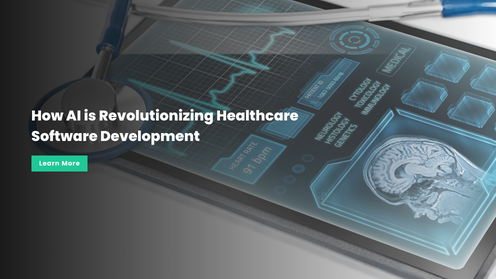Healthcare software development is greatly benefiting from artificial intelligence. It is making pharmaceutical research move more quickly. Also, it empowers medical professionals to treat patients more effectively and promptly. Covid-19 has changed the perception of healthcare app development. It is not a luxury anymore; it has become a need.
Artificial intelligence (AI) solutions are rapidly becoming essential tools for a wide range of tasks. This includes efficient patient care optimization, administrative duties, and procedure efficiency, in addition to disease diagnosis and detection.
Artificial intelligence (AI) is causing a massive transformation in the healthcare sector. AI is revolutionizing the field of healthcare software development and ushering in a new era of medical research, patient care, and general health management.
This article examines the innovative ways AI is transforming the development of healthcare software as well as the promising future applications.
Enhancing Diagnosis and Treatment
In the past, doctors have diagnosed and treated patients based mostly on their senses and experience. AI is transforming this by providing healthcare software development with capacities that are greater than those of humans.
- Large volumes of medical data are analyzed by machine learning algorithms. For example, those from imaging scans, research studies, and patient records. As a result, AI is able to spot patterns and trends that human doctors might overlook. This enables an earlier and more precise diagnosis.
- Doctors are assisted in understanding medical images such as MRIs and X-rays by AI-powered diagnostic tools. AI powered apps can highlight problems and make suggestions for possible diagnoses. Moreover, these tools can increase accuracy overall and save a significant amount of time.
- Treatment plans are made more unique by AI-driven treatment planning. This includes the genetics, lifestyle, and medical background of each patient. By using precision medicine, side effects are reduced and outcomes are enhanced.
Improving Efficiency and Streamlining Workflows
Office work and paperwork are a common burden for healthcare professionals. Artificial Intelligence is streamlining these processes. This method frees up vital time for medical attention to patients. AI powered applications can learn about patient preferences and physician availability. This automated scheduling system can produce efficient appointment schedules.
Chatbots powered by AI are able to schedule appointments and reply to common patient questions. It can even do preliminary symptom assessments, saving nurses and doctors time.
Moreover, machine learning algorithms can automate medical record management, report generation, and patient data analysis. This enables medical personnel to focus on more challenging tasks and spend more time with patients.
Revolutionizing Drug Discovery and Development
The conventional approach to drug development and discovery is costly and time-consuming. AI is speeding up the software development process for the healthcare industry. This process provides strong research and development tools.
AI-powered drug screening: It is able to examine enormous libraries of molecules and find those that might be useful in medicine. This shortens the duration and expense of using conventional drug discovery techniques.
Machine learning algorithms: ML can forecast a drug’s effectiveness and possible adverse effects. While it is still in the research and development stage. This enables researchers to concentrate on candidates who show promise and have a better chance of succeeding.
AI-driven clinical trial design: AI can improve patient selection and trial procedures, producing more effective and definitive research results.
Personalized Medicine and Patient Empowerment
AI is opening the door to a personalized medicine future. A future where the requirements and preferences of the patients are considered.
- Wearable technology with AI capabilities tracks health metrics. For example, it can record blood pressure, heart rate, and sleep patterns. This information can be used to assess potential health risks and customize preventive care strategies.
- Chatbots with AI capabilities can provide patients with individualized experiences. It can provide support for long-term conditions, medication reminders, and individualized health information.
- AI-powered mental health apps offer tailored assistance and remediation resources. These resources can help with anxiety, depression, and other mental health conditions.
Challenges and Considerations
AI has a lot of potential for healthcare software development. But there are some issues to take into account. When handling sensitive medical data, privacy and data security are top priorities. AI systems must be designed with robust security measures in place.
The presence of bias in AI algorithms may result in incorrect or unfair diagnosis and treatment suggestions. To reduce bias, developers must make sure AI models are trained on a variety of datasets. AI-powered healthcare solutions can be expensive. Therefore, some healthcare organizations may find it challenging to develop and implement them.
The Future of AI in Healthcare Software Development
AI will surely play a larger role in healthcare software development in the future. We can expect to see even more cutting-edge uses of AI as technology develops. A few applications of AI in the healthcare industry are listed below.
AI-powered diagnostics: Imagine artificial intelligence (AI) algorithms that analyze patient data and medical scans. An algorithm that can detect diseases exceptionally accurately, even in their early stages. This might result in an earlier diagnosis and better treatment results. As a result, you can even discover cures for diseases that are currently incurable.
Personalized medicine: By customizing care for each patient, AI has the potential to transform medicine. Artificial intelligence can recommend individualized treatment plans. It can also forecast a patient’s potential response to various medications by examining their individual genetic makeup, medical history, and lifestyle factors.
AI-powered drug discovery: AI can search through enormous databases of molecular structures to locate promising therapeutic candidates. Also, AI can greatly speed up the drug discovery process. This might result in the creation of novel, more potent drugs much more quickly.
Enhanced clinical workflow: Artificial intelligence (AI) tools can automate routine tasks that medical professionals currently perform. This will free up their time for more complex patient interactions. AI is also capable of analyzing patient data to identify possible issues and recommend interventions. This can streamline procedures and enhance patient care in general.
Healthcare software development has the potential to bring about a new era of personalisation. You can create effective and preventive medicine by utilizing AI. This will ultimately lead to a healthier future for everyone.
Conclusion
The healthcare software development industry is being revolutionized by AI at a rate never seen before. Artificial intelligence has the potential to revolutionize the healthcare sector. It can enhance the lives of millions of people by providing new instruments for diagnosis, treatment, research, and patient empowerment.
Working with a top-tier healthcare app development company is essential to maximizing the benefits of AI in your app’s development. This will ensure that AI is used ethically and responsibly to create a healthier future for everyone. It is essential that we address the issues of data security, bias, and accessibility as we move forward. Apart from building healthcare apps, it is crucial to find out SaaS application development company these days.





